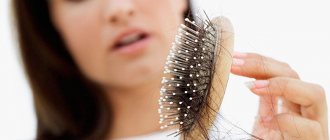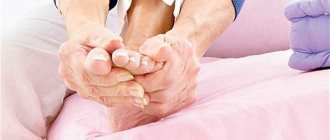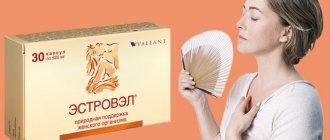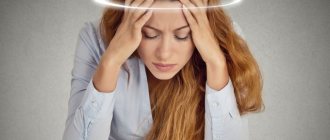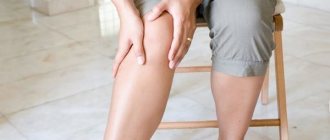Reasons for violation
Many ladies wonder whether hair can fall out during menopause. Practice has shown that during menopause processes actually occur that lead to trichorea. The disorder occurs due to changes in hormonal levels.
During childbearing age, the female hormone, estrogen, predominates in the body. When menopause occurs, its level drops sharply. Testosterone, the male hormone, on the contrary, is produced more actively, which is why baldness can occur.
However, there may be other reasons for loss:
- anemia;
- constant stress and overwork;
- disruption of the thyroid gland, adrenal glands and hypothalamus;
- long-term use of certain medications;
- trichomycosis (fungal disease of the scalp);
- serious chronic and acute diseases;
Improper hair care, poor nutrition and bad habits (smoking, drinking alcohol) also provoke alopecia.
Treatment of disorders during menopause
The approaches adopted in modern gynecology to the problem of treating the pathology of menopause are based on reducing its manifestations and symptoms. Reducing the severity and frequency of “hot flashes” during the pathological course of menopause is achieved by prescribing antidepressants (venlafaxine, fluoxetine, paroxetine, citalpram, sertraline, etc.).
To prevent and treat the development of osteoporosis during menopause, non-hormonal biophosphonate drugs (alendronic and risedronic acids) are used, which reduce bone loss and the risk of fractures. Biosphosphonates effectively replace estrogen therapy in the treatment of osteoporosis in women during menopause.
To reduce the manifestation of urogenital symptoms during the pathological course of menopause, local (vaginal) administration of estrogen in the form of cream or tablets is recommended. The release of small doses of estrogen into the vaginal tissue reduces the sensation of dryness, discomfort during sexual intercourse and urinary disorders.
The most effective method of treating menopausal syndrome during menopause is hormonal therapy individually prescribed by a doctor. Taking estrogen drugs effectively eliminates, in particular, “hot flashes” and discomfort in the vagina. For hormone therapy in the treatment of menopause pathology, natural estrogens (estradiol valerate, 17-beta-estradiol, etc.) are used in small doses in intermittent courses. To prevent hyperplastic processes in the endometrium during menopause, a combination of estrogens with gestagens or (less often) with androgens is indicated. Courses of hormonal therapy and hormonal prophylaxis are carried out for 5-7 years to prevent myocardial infarction, osteoporosis and stroke.
Hormone therapy as a treatment for menopause pathology is contraindicated in patients suffering from:
- endometrial, ovarian, breast cancer;
- coagulopathy (blood clotting disorder);
- liver dysfunction;
- thromboembolism, thrombophlebitis;
- uterine bleeding of unknown cause;
- renal failure.
Before prescribing hormonal medications for patients with menopause pathology, it is necessary to conduct studies: ultrasound of the pelvic organs, ultrasound of the mammary glands and mammography, cytological analysis of smears of discharge from the cervix, biochemical study of blood test parameters and coagulation factors (coagulogram).
The appearance of the first symptoms of menopause, before the age of forty, is a compelling argument for examination
Ways to fix the problem
How to stop hair loss during menopause, the doctor decides. Immediately, as soon as you notice intense loss of strands, you should contact a trichologist or gynecologist-endocrinologist. The specialist will prescribe you a series of tests that will help identify the root cause of the problem. Without eliminating it, it will not be possible to restore thickness to your hair.
Therapy is selected individually, depending on the needs of the individual patient’s body. It should be comprehensive and aimed at restoring hair growth and maintaining the normal functioning of the remaining follicles.
Which doctor are we going to?
Each person loses a certain amount of hair per day, and this is the norm. But if hair begins to fall out in greater quantities, then it is necessary to focus on this problem and find out what to do and what caused it. To answer your question, you need to visit such specialists as:
- endocrinologist;
- dermatologist;
- trichologist;
- gynecologist.
To find out exactly why your hair is falling out, you need to undergo the following tests:
- a blood test for TSH allows you to find out about the condition of the thyroid gland;
- general blood analysis;
- analysis of the level of male sex hormones – androgens;
- a blood test that determines the concentration of iron - to exclude iron deficiency anemia.
Referrals for these studies should be prescribed by an endocrinologist.
Note! Only after receiving the results and establishing the exact cause of hair loss, the doctor will be able to prescribe the correct treatment. Based on the test data, the endocrinologist must draw up an individual treatment regimen for the patient.
Drug therapy
If hair loss in older women is associated with impaired hormone production, replacement therapy is prescribed. This means that you will need to be treated with drugs that are estrogen substitutes. With its artificial administration, the normal functioning of the follicles is restored.
Other remedies may also be prescribed to eliminate the problem:
- Phytoestrogens. Substances of plant origin that are identical to hormones produced in the female body. They have a similar mechanism of action to endogenous estrogens, which is why they are often used to treat alopecia and trichorea. Despite their natural composition, these medicinal preparations are used only under the supervision of a physician.
- Vitamins and minerals. If estrogen production does not drop significantly, then the loss can be stopped with the help of vitamin and mineral complexes. The most useful substances for hair will be the following: magnesium, iron, phosphorus, vitamins A, E, D3, C and the entire group B.
- "Minoxidil." A topical treatment that has an irritating effect on the scalp. It activates blood circulation, triggers metabolism in the follicles, which leads to hair growth and slows down hair loss.
- Products containing furukomarin. The substance is aimed at increasing the sensitivity of the dermis to ultraviolet rays. It leads to the acceleration of blood circulation and metabolic processes, strengthening the roots and launching the growth of new strands.
Your doctor should prescribe any medications for you. He also calculates the dosage of drugs and the duration of their use.
Under no circumstances should you treat hair loss without consulting a specialist, otherwise you will only worsen the problem. With the right approach, the disorder is eliminated after 2-3 months of therapy.
Classification of menopausal disorders
According to its manifestations, menopausal syndrome is divided into early, middle and late manifestations of menopausal disorders. Early manifestations of menopausal disorders during menopause include:
- vasomotor symptoms - feeling of hot flashes, headaches, increased sweating, chills, fluctuations in blood pressure, palpitations;
- psycho-emotional symptoms - weakness, anxiety, irritability, drowsiness, inattention, forgetfulness, depression, decreased libido.
Early manifestations during menopause include premenopause and 1-2 years of postmenopause. Women with vasomotor and psycho-emotional symptoms during menopause are often treated by a therapist for hypertension, coronary heart disease, or by a psychoneurologist diagnosed with neurosis or a depressive state.
Medium-term manifestations of menopausal disorders during menopause include:
- urogenital symptoms - dryness of the vaginal mucosa, painful sexual intercourse, burning, itching, dysuria (increased urination and urinary incontinence);
- symptoms from the skin and its appendages - wrinkles, brittle nails, dry skin and hair, hair loss.
Medium-term manifestations during menopause are observed 2-5 years after menopause and are characterized by atrophic changes in the skin and urogenital tract. As a rule, symptomatic treatment of urogenital and skin symptoms during menopause does not give the desired effect.
Late-time manifestations of menopausal disorders during menopause include:
- metabolic (metabolic) disorders - osteoporosis, atherosclerosis, Alzheimer's disease, cardiovascular diseases.
Late-time manifestations during menopause develop 5-10 years after the onset of menopause. Insufficient levels of sex hormones during menopause lead to disruption of the structure of bone tissue (osteoporosis) and lipid metabolism (atherosclerosis).
ethnoscience
Traditional medicine can be used as auxiliary drugs. They will support the health of the remaining hair follicles and awaken those that are dormant.
Irritating substances will help activate the follicles:
- mustard powder;
- hot peppers;
- alcoholic herbal infusions;
- strong alcohol (vodka, rum, cognac).
However, keep in mind that these substances have a drying effect. They should be applied only to the scalp and roots, and the lengths and ends are best treated with base oils of ylang-ylang, cedar, olive, apricot and peach kernels, coconut, avocado, etc.
To improve the therapeutic effect, natural masks are kept under a plastic cap and towel.
Nutrition and lifestyle
A woman should take care of her health from an early age, so that when entering menopause she does not panic about what to do with changes in the body. Scientists have proven that if in youth there is a tendency to lose curls, then most likely they will fall out during menopause.
Proper nutrition will help you normalize the condition of your entire body and increase the thickness of your hair. The diet should contain a minimum of heavy, fatty and high-carbohydrate foods.
Give preference to fresh vegetables, herbs, nuts, fruits and dairy products. Limit your consumption of strong coffee and tea.
Also adjust your lifestyle:
- Get enough sleep. For proper rest, a person needs 6-8 hours of sleep at night.
- Spend more time outdoors. Saturating the body with oxygen has a beneficial effect on metabolism and the functioning of the nervous system.
- Control your weight. Extra pounds can lead to disruption of metabolic processes and thinning of hair .
- Avoid stressful situations. Strong emotional experiences negatively affect the functioning of the immune, endocrine and other systems.
- Play sports. Reviews from women confirm that moderate physical activity makes it easier to survive menopause and minimize its negative consequences for the psyche and body.
Get rid of bad habits - smoking and alcohol abuse ages us. In old age, bad habits act several times faster, as the body’s protective functions decrease and it is unable to remove all toxins.
Subtleties of care
If in your youth you did not pay much attention to your curls and did not worry about it, during menopause you need to reconsider your attitude. Hair can fall out even from improper combing, as it is very weak and prone to damage. Careful care will help maintain the thickness of your hair.
Follow these simple rules:
- Choose a shampoo and conditioner that suits your hair type. Pay attention to sulfate-free products - they do not irritate the scalp and do not cause side effects.
- Use only ammonia-free dyes. Even a large percentage of gray hair can be masked with safe compounds that should contain no more than 3% hydrogen peroxide.
- Avoid heat styling. Hairdryers, curling or straightening irons, and even curlers should be put in the back drawer. These devices dry out your hair, making it brittle and prone to loss.
- Use cosmetics wisely. Use styling products to a minimum; it is advisable that they do not contain alcohol, which dries out the skin and strands. Apply protective products to your hair, especially in summer and winter.
Also avoid contact of hair with chlorinated water. When washing, it is better to use filtered or boiled water.
